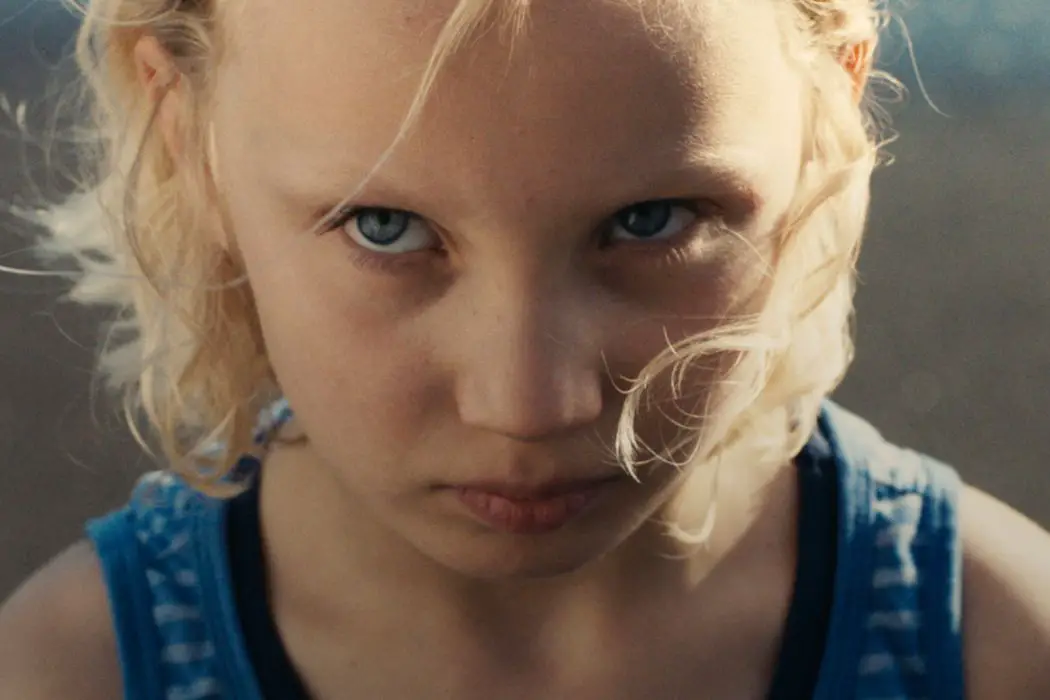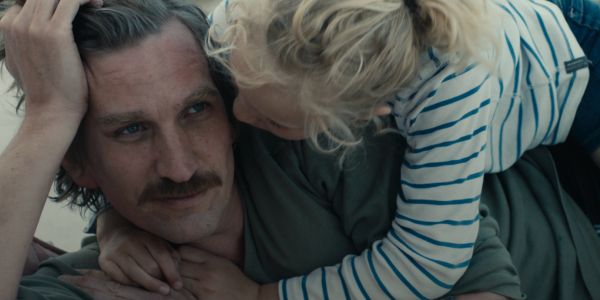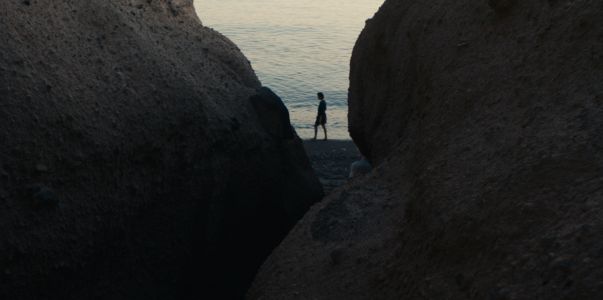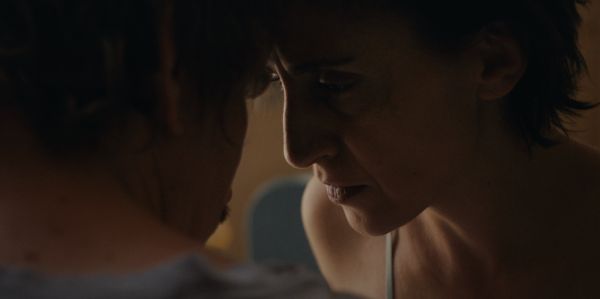DARK BLUE GIRL: German Psycho-Thriller Disguised As Family Drama

Sasha has written for Roger Ebert's website, The Worcester Journal,…
If I weren’t so tired of psychoanalytic film theory, I would have a field day trying to write about this movie. In fact, even though I’m not personally going to delve into such entirely marginal yet impossible to disprove ideas as castration, penis envy, rejection of the mother and Oedipal complexes, it seems an awful shame for a film like this one not to be taught in at least a few college courses somewhere down the line. (Burgeoning professors, a.k.a. my fellow English/film major grads, take note.)
Dark Blue Girl (translated from the German title, Die Tochter, the daughter) is the strange story of a young girl who does everything in her power to ruin the reconciliation of her divorced parents. This doesn’t sound all that eerie in its most basic description, but I assure you, it is. The feature debut from German director Mascha Schilinski has already received a fair amount of attention in its short life span since this year’s Berlin International Film Festival, having been nominated for the GWWF Best First Feature Award and recently announced the winner of the grand jury prize (along with awards for sound design and music) from Germany’s Filmland MV festival. Festival selections from unknown names can often feel hit-or-miss, but I had high hopes going into the theater that this would be, at the bare minimum, an interesting story with a lot to talk about; I can safely say I was not disappointed.
In the eyes of a child
In beautiful, often ocean-filled, sometimes slow-motion cinematography, we follow seven-year-old Luca (Helena Zengel) as she deals with her parents Jimmy (Karsten Antonion Mielke) and Hannah (Artemis Chalkidou) two years after their divorce, as the family travels to Greece to fix up their old soon-to-be-sold vacation home and confront some troubling aspects of their group dynamic. This is a movie about the various roles we take on in different types of intimate relationships and man, does this family have some bizarre relationships to work out.

Although there are separate moments with the parents on their own which allow audiences to try and see things from all points of view, it is clear from the beginning that we are experiencing the story from Luca’s perspective. She is our protagonist and, by the end, perhaps some might consider her an anti-heroine. We begin with Hannah and Jimmy informing their then-five-year-old daughter of their decision to divorce, which seems to be, naturally, upsetting to her. Within five minutes, though, we’ve flashed forward two years, and see that Luca has easily adjusted by now to having each parent’s undivided attention (most of the time). Our impression of her is clear; she has a strange and interesting look at all times and is undeniably a force to be reckoned with. Zengel has as much command over the camera as Luca does over her parents, particularly her father.
Daddy, dearest
Immediately, we can sense that the relationship between father and daughter is meant to feel a bit more potent and complex than that, however, and slightly less innocent. The first long sequence of Luca and Jimmy together is revealing and bizarre, showing Luca sitting her father down—as children are wont to do—so she can put on a performance for him. Something doesn’t feel right, though; it could be Luca’s peculiar flowing gestures, as she moves her arms slowly and gracefully, more like a goddess or some gentle witch than an ordinary kid; it could be her father’s unflinching gaze of affection and pride, played out in long, slow reaction shots as he watches his daughter dance for him. Dramatic, low synth sounds from German electronic group ANNAGEMINA’s soundtrack certainly don’t make Luca’s performance seem any less eerie or weirdly inappropriate.
The scene is a spectacular way to both cement our uncertainty and unleash our discomfort; it gives permission to both see this father and daughter the way Luca sees themselves, and yet very clearly draw very smudged lines in our understanding of the relationship. Our access to the child’s perspective is extended with the imaginary bubble Luca draws around her father—though, of course, because we see it through Luca’s eyes, the bubble and its protective powers feel far from imagined. With platinum hair and an uncomfortably unreadable face, Zengel’s Luca is an alien star that demands the spotlight, anywhere she can find it.
We know we’re on each other’s team
The sense of closeness between Luca and Jimmy is heightened by the arrival of Hannah, who functions, in Luca’s eyes, not as a loving parent but purely as a restrictor of time spent with her other loving parent. This is one trope that feels a little tired—the mother as villain while the father is a source of free love and fun—but entirely appropriate for this story. When Hannah has the two over for a family spaghetti dinner, the teams are obvious; a fairly significant bond in the relationship between Luca and Jimmy is their shared distance from Hannah and, thus, the willingness to make fun of her—for her cooking, for being boring, for being the ultimate destroyer of fun and family.

Jimmy’s inability to recognize when it is and isn’t appropriate to openly side himself with Luca is one of the primary reasons it is difficult to see Luca as an anti-heroine and Hannah as an antagonist, as they may see themselves, or each other, in this situation. Even by the end of the movie, Hannah and Luca’s behavior is at least understandable and we may be sympathetic to their individual motivations, but Jimmy’s intentions are not as clear. By behaving towards his daughter in a manner of mutual affection and respect rather than as an authority figure, he elevates Luca to the status of an adult with whom he can be honest and share all the same gripes and pleasures, at the same time as he reduces himself to a man with the maturity of a seven-year-old.
Dissecting audience discomfort
Questionable parenting behavior abounds in Dark Blue Girl, and isn’t limited to just Jimmy. Once he and Hannah have reignited their passion for one another (in a tense session of house cleaning that suddenly turns into masturbatory simulation), the teams in the family quickly change and the adults have little to no regard for Luca, except when it comes to appeasing her (and only so much that she leaves them alone). Because Luca insists on sleeping in the same bed as her father, Hannah suggests they all sleep in the big bed together—only to leave Luca lying awake while her naked parents continue caressing each other, either oblivious to their daughter’s presence or in spite of it. It’s weird, and it’s bad parenting even in a movie that asks us to suspend our disbelief, and there’s just no way around it.
This has nothing to do with the quality of the story, though; it’s purely to do with me confronting my own discomfort as a viewer, which I’m inclined to believe must have been one of the movie’s primary objectives. On the movie’s website, director Mascha Schilinski recounts two episodes she witnessed which inspired the story behind Dark Blue Girl; one about a little boy who manipulates his parents into paying attention to him by faking injury, and one about an old man seen with a young woman who were later joined by an older woman, and how the trio were revealed to be father, mother, and child, though they initially may have appeared as husband, wife, and mistress. These are the roles explored in Schilinski’s film and source of audience’s main discomfort: you simply can’t help but see the family dynamic through sexual metaphor, and thus, can’t help that the recurring idea of Luca as either wife or mistress puts her in a (hypothetical) sexual role.

I was reminded of the 12-year-old girl from Malaysia who was recently removed from a chess tournament because her completely conservative and age-appropriate dress was deemed “seductive” and “temptation,” and all the backlash on social media with most responses along the lines of, “If she’s ‘too young to be dressed like that,’ then she’s too young for you to be sexualizing her.” Luca is undoubtedly of the “too young” age, yet it is almost required of us to try and see her in this light in order to understand the psychology of the characters and the story Schilinski set out to tell.
It only becomes more and more obvious that Luca is behaving like one of Jimmy’s girlfriends in bouts of jealousy and manipulation. The “who’s it gunna be?” tension hangs heavy over every scene in the Greek summer house. Luca and Jimmy even have a direct conversation about it— “Who do you love more?”—which further drives a theory that Jimmy is the antagonist in this story, or at least, he’s in the wrong when he assures his daughter that it’s her, he loves her more, he is always on her side, etc. The true climax of the husband/wife/mistress tension comes when Luca finally decides to run away, screaming at Jimmy, “Kiss my ass! When I’m gone forever, you’ll regret it!” The sentiment may be universally ageless, I guess, but at this point of Dark Blue Girl, there’s no way Luca’s harsh words are coming from a neglected child; this is jealous Luca, all the way.
Conclusion
That Jimmy turns out to be just as much a cowardly loser as we hoped brings at least some of the story to resolution. Despite my determination to focus on the strengths in most people/characters, I’m always anxious to see how we’re supposed to view female characters when pitted against one another, but I was relieved when the movie ended with both mother and daughter on the same page and the source of their Bechdel-test-failing tension removed. Only by the end, when seemingly disconnected shots of two street cats scattered throughout Dark Blue Girl come to a conclusion with one of the cats giving birth, does the role of the mother come into full focus.
Dark Blue Girl now feels like something of a cautionary tale for motherhood, or parenthood in general, one that reminds us that no one has control over who their child will become. Anyone can play the role of partner or parent with little or no consequence if forever seems too long, but there is only one person who carried you from nothing into something, from nonexistence into life—and that relationship, whether we like it or not, is permanent.
What other movies got you thinking about Freud? Let us know in the comments!
Dark Blue Girl premiered internationally in June 2017 at the LA Film Festival in the World Fiction Competition.
Does content like this matter to you?
Become a Member and support film journalism. Unlock access to all of Film Inquiry`s great articles. Join a community of like-minded readers who are passionate about cinema - get access to our private members Network, give back to independent filmmakers, and more.
Sasha has written for Roger Ebert's website, The Worcester Journal, and Dictionary.com. She is also the founder/editor-in-chief of Germinal, a new online magazine for politically-minded creative youth. In August, she will begin the MA program for Cinema & Media Studies at USC. It is very difficult for her not to take it personally when people let her know that they tried to watch Mad Men but just couldn't get into it.













